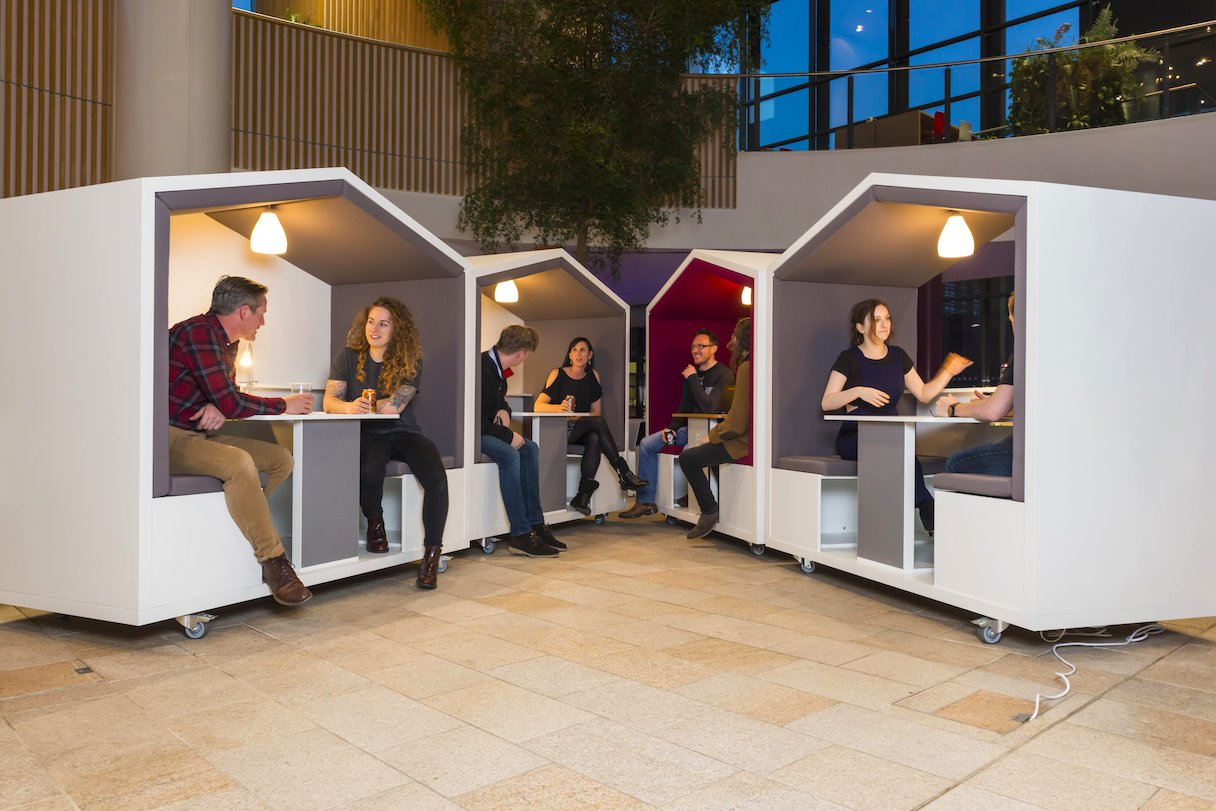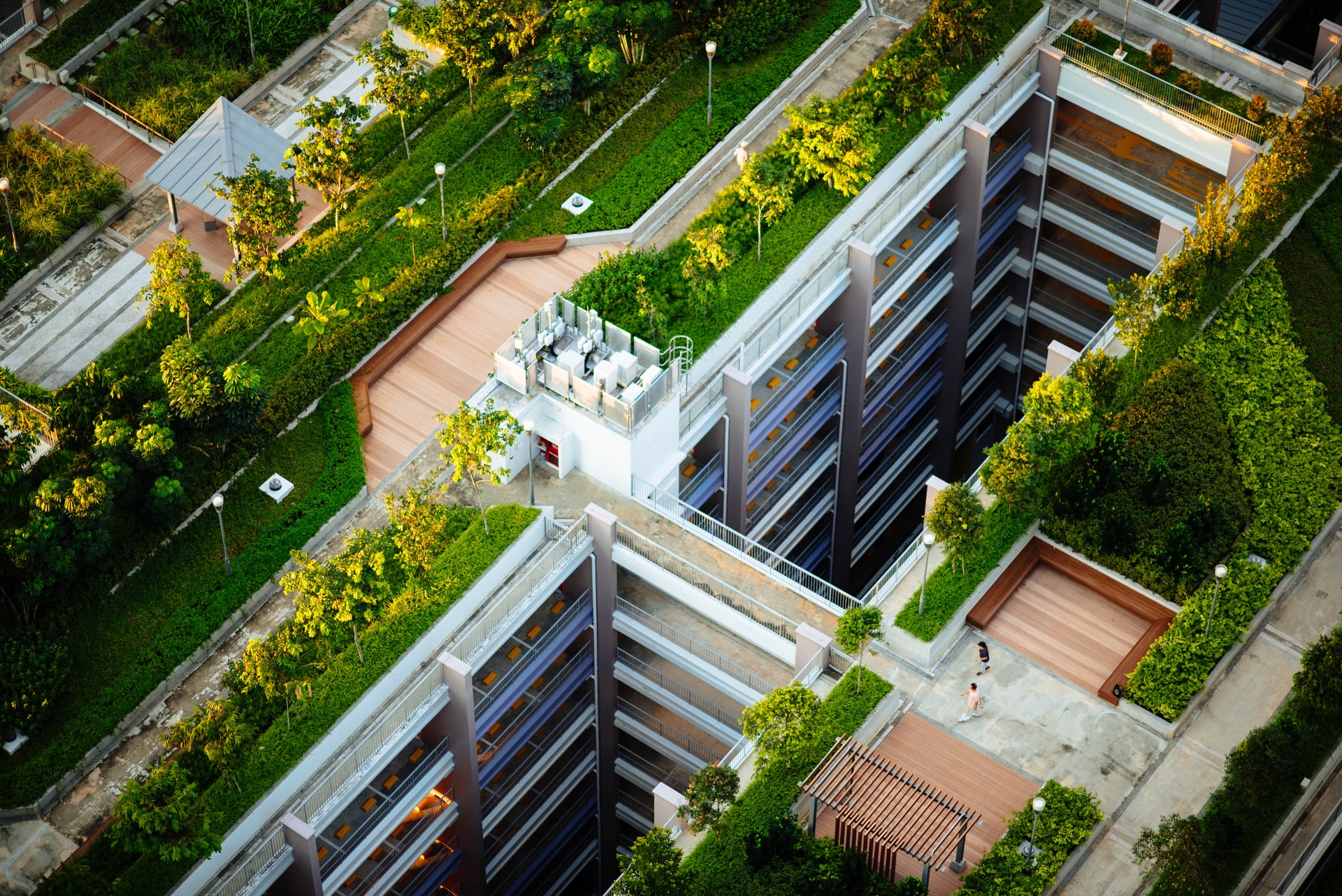10 sustainable solutions for your coworking or flex space
If you’re looking to make your coworking space a little greener this year, you’ve come to the right place. Join us on a journey through 10 sustainable solutions for your space, from eco-friendly search engine alternatives to vegan food for your member events.
1. Nook Wellness Pods
These highly functional work booths are perfect for today’s agile workspaces. They come on wheels so are easy to move around your space when you need to reconfigure. You can control the lighting tones and colours, and choose from a range of different fabrics.
But what really sets the range apart is its sustainability credentials.
The website’s sustainability policy reads: “The goal of nooks design is to create a closed loop product life cycle, in which all elements used in the creation of the product are reused, recycled or remanufactured rather than discarded.” Here’s what it looks like in action:
Materials derive from sustainable sources
Highly durable fabrics are used
Recyclable components are easy to refurbish
Nook’s factory runs on solar panels and biomass heating

Image credit: Nook Wellness Pods
2. Ecosia
Ecosia is an eco-friendly search engine hailing from Germany. It donates 80% or more of its surplus ad earnings to non-profits that specialise in reforestation and conservationism. Millions of trees have already been planted across Ethiopia, Brazil, Indonesia, Spain and other biodiversity hotspots. Privacy is another perk: searches are always SSL-encrypted.
It’s quick and easy to add Ecosia to Google Chrome as an extension. So, the next time you need to use the internet to research something for your space, consider switching to Ecosia!

Image credit: David Vig
3. LED lighting
Lighting accounts for somewhere between 10-20% of a commercial building’s energy consumption. Energy-efficient lighting is an energy saving alternative to incandescent light bulbs because, depending on the type, it uses 25-80% less energy.
Incandescent lighting, on the other hand, loses up to 90% of its energy to heat. Compact fluorescent light bulbs (CFLs) and light-emitting diodes (LEDs) are popular alternatives. To make your lighting even more environmentally friendly, explore renewable energy and solar panels, and try to utilise as much natural light as you can to save energy.
4. Eco-friendly coffee maker
It’s estimated that every single minute, 39,000 single-use coffee capsules are made worldwide, and 29,000 are dumped in landfill sites. There’s really no excuse for coworking spaces to be relying on single-use pods these days when there are so many alternatives.
Generally speaking, the bigger and more complex the machine, the more energy-intensive. Opt for equipment made from stainless steel or glass, and avoid plastic. Nexudus integrates with TopBrewer, a coffee solution designed to look like a tap. TopBrewer’s coffee is sourced directly from farms that grow the plants as sustainably as possible.
5. Motion sensors
How “connected” is your coworking space?
Motion sensors that monitor occupancy are one of the most effective energy saving lighting strategies on the market today. By detecting movement in a space, they ensure that lighting isn’t switched on when there’s nobody there to benefit from it.
Install your motion sensors in areas that aren’t used as frequently as, say, your breakout spaces or coworking area. Think about nooks and crannies where lights can be left on by accident, such as meeting rooms, bathrooms, storage areas, bike sheds and private offices.
6. Plug-in timers & smart power strips
Like motion sensors, plug-in timers and smart power strips are useful tools when it comes to saving energy. You can use plug-in timers for appliances like coffee machines, printers and cable boxes to ensure that they aren’t left on and use energy over the weekend when nobody’s in. As the word ‘timer’ suggests, they’re completely customisable.
Smart power strips are newer. The strips use a motion sensor to detect movement. When no occupancy is detected, they switch the workstation into hibernation mode. You can also get strips that detect when a computer is in hibernation mode and shuts it down.
7. A green roof
Green roofs are sustainable for a number of reasons. Firstly, they have the ability to reduce a building’s operational costs and energy consumption by keeping it cooler in the summer and more insulated in the winter. They can improve the drainage system. Water is stored in plants and released back into the environment naturally, reducing the risk of flooding.
Greenery also helps protect the roof’s waterproof membrane, doubling or even tripling its lifespan. They also help clean the air and create healthy habitats for a number of plant and animal species, including birds and squirrels. A study of 11 green rooftops in Switzerland found there to be an amazing 172 separate species living on them.

Credit: Chuttersnap
8. Second hand solutions
Buying used furniture is often much more cost-effective, sustainable, and ethical than investing in brand new things. There are lots of companies out there who specialise in selling recycled office furniture.
You might also want to consider buying from a local second hand shop. By buying local you’re pumping money into the local economy and community. If you’re looking to revamp your coworking space but don’t want to throw anything out, some companies will upcycle your existing things to make them as good as new.
9. Quality HVAC system
How eco-friendly is your Heating, Ventilation and Air Conditioning system?
Variable refrigerant flow (VRF) is a super efficient type of HVAC. VRFs use a single outdoor condensing unit instead of air ducts to provide heating and cooling and can be set to different temperatures. Perfect for spaces with diverse heating and cooling zones, they use recovered heat from cooling, making them way more energy efficient.
10. Vegan food
The production of our food accounts for 25% of global greenhouse gas emissions and takes up half of the world’s habitable space. According to the UN’s Food and Agricultural Organisation (FAO), meat and dairy alone account for 14.5% of these emissions.
That’s the same as all cars, HGVs, aircraft, and ships combined.
People are a lot more aware of the environmental benefits of veganism now, so it could be the perfect time to give it a whirl in your coworking space. Do a poll to gauge how interested your members would be in vegan menus at events, and a veto on anything palm oil based.
Related stories
Global Coworking Trends and Opportunities for 2025
Now well into 2025, the coworking industry continues to demonstrate strong momentum. With demand for coworking spaces remaining steady around the globe, it's clear that coworking is not just enduring—it's thriving. Let’s explore the major trends and opportunities shaping the global coworking landscape this year.
Creating Events that Drive Community Engagement in Coworking Spaces
Community is everything in coworking, but a genuine sense of connection between members doesn’t magically happen overnight or by chance. Often, meaningful relationships take intentionality, effort, and time to build, with events being an effective vehicle for bringing people together around shared interests, goals, and experiences, creating opportunities for collaboration, and a thriving coworking culture. This article looks at creating events that drive community engagement in coworking spaces.
Liz Elam: ‘Community is the number one amenity in coworking spaces’
A household name in the global coworking industry, Liz Elam, is the founder of one of the world’s best coworking event series: GCUC. Liz’s coworking roots began in 2010, when she established Link Coworking – a welcoming, affordable, and professional coworking space – in her hometown of Austin, Texas. Link Coworking achieved incredible success, expanding across three locations and becoming the fourth-largest coworking brand in Austin. It was sold in 2019, making Liz the first woman globally to exit a coworking brand.
Key Takeaways from the Coworking Alliance Summit 2025
Gathering online for the Coworking Alliance Summit last week, members of global coworking alliances, coworking spaces, and community leaders came together to navigate global issues, strengthen ties across the coworking industry, and work collectively towards future goals.
5 Ways to Reduce Noise in Open Offices & Coworking Spaces
Some people like working against a background of noise, while for others it’s their worst work nightmare. The truth is, our relationship with noise depends on our own preferences and the nature of our work.
Key takeaways from the Workspace Design Show 2025
London’s Workspace Design Show is undoubtedly one of the best coworking events of 2025. For one, the exhibition (held at Islington’s Business Design Centre) features a host of innovative and creative workspace design solutions tailored to the needs of modern workplaces.
What Is Workplace Management and Why Does It Matter?
There has always been a need for workplace management – the process of organising and optimising physical spaces, resources, and operations to support people’s needs. But, as 28% of UK working adults were reported to work in a hybrid capacity last autumn (by the Office for National Statistics), the question of ‘why workplace management matters’ is more critical than ever. Let’s look at the workplace management benefits for your operations.
10 Smart Goals for your Coworking Space: How to Set & Achieve Business Objectives
Coworking is synonymous with creativity, collaboration and productivity. Businesses and freelancers love coworking spaces because (by surrounding themselves with fellow workers) they’re more likely to achieve their goals. The coworking environment, while social, is set up to facilitate focused, distraction-free working.
The Best Coworking Events in 2025: Must-Attend Gatherings for Professionals
Managing coworking spaces is an all-encompassing role, often leaving operators, owners, and community managers with little time to focus on personal growth or draw inspiration from others.
10 Award-winning Coworking Space Designs: A Comprehensive Guide
Vibrant, contemporary workspaces create an undeniable ‘wow’ factor. Textured designs and ambient lighting make spaces feel warm and cosy, while natural elements and biophilic design features have literal mood-boosting properties.

